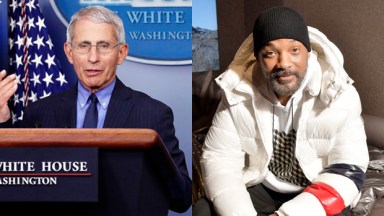
Actor Will Smith, 51, has been combatting the coronavirus pandemic by offering some humor along with info to Snapchat users across the globe with his show Will From Home. Recently, he sat down with Dr. Anthony Fauci, 79, America’s top infectious disease expert, to discuss when the United States can return to some semblance of normalcy. On the April 22 show, Will and Dr. Fauci invited kids to ask questions they had about the global pandemic. One thing kids wanted to know: will they be able to go back to school this fall? “That’s totally dependent on what happens on whether or not we get a rebound on the virus or not,” Dr. Fauci explained. The physician admitted, “not enough people, I think, have gotten infected to make it a true immunity [referring to what experts call, ‘herd immunity, which means that enough people in the United States have developed antibodies against COVID-19 so that it stops the spread of the virus].”
Dr. Fauci explained that the biggest determinate of what will happen in the future is “the penetrance of virus at a given time. If there’s still virus that’s lingering around there as we get to a new school season, there are going to be some locations that are, appropriately, going to be hesitant to get the kids back to school,” Dr. Fauci admitted. However, he did offer some hope to kids eager to know when they will be back in the classroom and on the playground with their friends. “If things look really quiet, not a lot of infections, many locations will be going back to school.”
For so many young people, especially kids, comprehending the current state of the nation and globe is incredibly complicated. But as one youngster asked when will this come to an end, or if this new normal will persist for years to come, Dr. Fauci revealed he has “confidence” that this is going to end. “I think this year has obviously been a bad year for us and the whole world. I don’t think it’s going to go away completely,” he warned. “I think we’re going to have a decline in cases as we get better control. And then, I suspect, as it’s a transmissible virus, I don’t think it’s going to go away.”
Progress is being made, however, to combat the spread of the deadly virus. “We are working on a vaccine,” Dr. Fauci reassured audiences, adding, “I believe once we have enough baseline in the community, then this is going to be something you won’t have to worry about for the rest of your life.” Dr. Fauci admitted that while things are “tough now, and it’s going to be tough for about another year,” circumstances will steadily improve. “This is something that’s going to go away. I promise you.”
Dr. Fauci’s expertise has been given a platform not only by Will, but also by NBA player Steph Curry, who joined Dr. Fauci for an Instagram Q&A on March 26. Like Steph, Will and his family are quarantining together and using opportunities, like Jada Pinkett Smith‘s Red Table Talk, to discuss the impact of COVID-19 and how they can do their part to “flatten the curve.” Will made a thoughtful analogy during the show’s March 18 episode, saying, “The way the virus is moving and the reason why we need to practice social distancing and the idea of flattening the curve is if 50 people show up at that hospital at one time, to get 40 beds, right, now you have 10 people in critical condition that aren’t going to get help. And your mortality rate shoots through the roof. That’s the idea of overwhelming the system.”
As of April 21, the Centers for Disease Control and Prevention has confirmed over 776,000 positive cases of coronavirus in the United States. Over 41,000 lives have been claimed by the deadly virus. UPDATE: As of April 22, the Centers for Disease Control and Prevention has confirmed over 802,000 positive cases of coronavirus in the United States. Over 44,500 lives have been claimed by the deadly virus.

![Red Carpet Event for the premiere of Apple Original Films’ “Emancipation”. 30 Nov 2022 Pictured: Trey Smith, Willow Smith, Jaden Smith, Will Smith, and Jada Pinkett Smith. Photo credit: GilbertFlores@Broadimage / MEGA TheMegaAgency.com +1 888 505 6342 (Mega Agency TagID: MEGA922279_002.jpg) [Photo via Mega Agency]](https://develop.hollywoodlife.com/wp-content/uploads/2018/05/Will-Smith-1st-Red-Carpet-Family-Oscars-MEGA.jpg?fit=440%2C305)
![Red Carpet Event for the premiere of Apple Original Films’ “Emancipation”. 30 Nov 2022 Pictured: Will Smith and Jada Pinkett Smith. Photo credit: GilbertFlores@Broadimage / MEGA TheMegaAgency.com +1 888 505 6342 (Mega Agency TagID: MEGA922279_009.jpg) [Photo via Mega Agency]](https://develop.hollywoodlife.com/wp-content/uploads/2018/05/Will-Smith-1st-Red-Carpet-Family-Oscars-MEGA-2.jpg?fit=440%2C380)